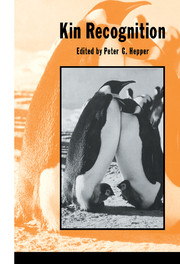Book contents
- Frontmatter
- Contents
- List of contributors
- Preface
- Introduction
- 1 The correlation between kinship and behaviour in non-human primates
- 2 Co-operation and reciprocity in birds and mammals
- 3 Kinship and fellowship in ants and social wasps
- 4 Successes and failures of parent–offspring recognition in animals
- 5 Kinship, kin discrimination and mate choice
- 6 Genetic components of kin recognition in mammals
- 7 Kin recognition in amphibians
- 8 Kin recognition cues of vertebrates
- 9 Recognizing kin: ontogeny and classification
- 10 Parental states as mechanisms for kinship recognition and deception about relatedness
- 11 Fetal learning: implications for the development of kin recognition
- 12 Information processing and storage during filial imprinting
- 13 The honey bee as a model kin recognition system
- 14 Mutual mother–infant recognition in humans
- Author index
- Species and common name index
- Subject index
4 - Successes and failures of parent–offspring recognition in animals
Published online by Cambridge University Press: 06 January 2010
- Frontmatter
- Contents
- List of contributors
- Preface
- Introduction
- 1 The correlation between kinship and behaviour in non-human primates
- 2 Co-operation and reciprocity in birds and mammals
- 3 Kinship and fellowship in ants and social wasps
- 4 Successes and failures of parent–offspring recognition in animals
- 5 Kinship, kin discrimination and mate choice
- 6 Genetic components of kin recognition in mammals
- 7 Kin recognition in amphibians
- 8 Kin recognition cues of vertebrates
- 9 Recognizing kin: ontogeny and classification
- 10 Parental states as mechanisms for kinship recognition and deception about relatedness
- 11 Fetal learning: implications for the development of kin recognition
- 12 Information processing and storage during filial imprinting
- 13 The honey bee as a model kin recognition system
- 14 Mutual mother–infant recognition in humans
- Author index
- Species and common name index
- Subject index
Summary
Introduction
Animals show both impressive feats and surprising failures of recognition. On the one hand, we have the Mexican free-tailed bat mother finding her young in a maternity cave of a million bats. On the other we have the redwinged blackbird parent failing to eject from its nest the conspicuously different eggs of a brood parasitic cowbird. From the evolutionary point of view, the failures of recognition are, on the face of it, much more difficult to explain than the successes. Any treatment of the evolution of recognition systems, therefore, must consider both faces of recognition – the failures as well as the successes. This is the perspective I take in this paper, drawing my examples from the parent-offspring context.
A source of conceptual confusion in the analysis of ‘failures’ of recognition has been the tendency of investigators to equate ‘recognition’ with ‘discrimination’. Typically, recognition is operationally defined in terms of discrimination, an animal being said to recognize a particular individual or class of individuals if it discriminates that individual or class from others (e.g. discriminates its offspring from other, unrelated young). For successes of recognition, this operational definition is perfectly reasonable. A failure of discrimination, however, could imply either that (1) discrimination is not possible, a true failure of recognition, or (2) discrimination is not adaptive in this circumstance.
- Type
- Chapter
- Information
- Kin Recognition , pp. 94 - 124Publisher: Cambridge University PressPrint publication year: 1991
- 64
- Cited by



